Flirting with the idea of buying or selling 100-year-old objects online? Here are the ground rules
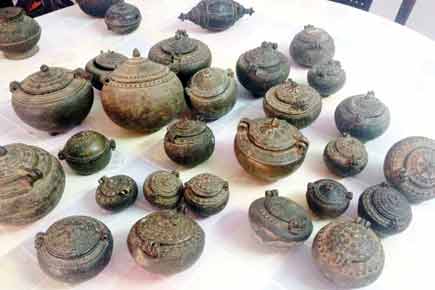
The collection of Chola coin pots put up on sale by Kochi resident Vishal Stephen priced at Rs 12,000
The history of southern India is dominated by the Cholas who ruled from mid-ninth century CE to early 13th century. With an empire that stretched from the Godavari, all across the Indian Ocean, to Maldives and Thailand, it is only obvious that Chola remnants turn up in odd places.
ADVERTISEMENT
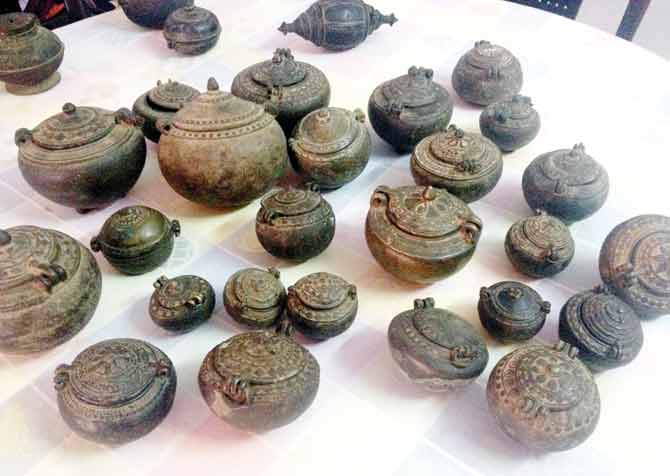
The collection of Chola coin pots put up on sale by Kochi resident Vishal Stephen priced at Rs 12,000
For instance, in August 2015, a Chola port, rich with coins and terracotta pots, was found submerged underneath a modern prawn fishery in Tamil Nadu’s Thanjavur district. But, that’s not the strangest site on the list of serendipitous discoveries. Engraved copper Chola pots, which look like modern-day tea-kettles, meant to store coins, have been turning up on e-commerce sites such as ebay, Quikr and OLX. The age of Indiana Jones has taken a digital twist.
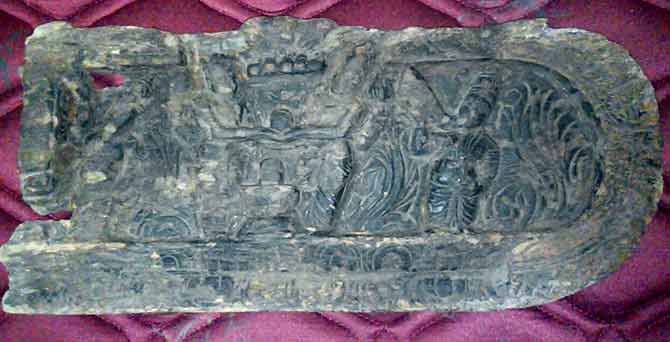
A wooden carving recovered from a demolished temple, on sale by Robin Rothmans, from Kollam in Kerala
Kochi-resident Vishal Stephen, for instance, is selling 20 Chola coin pots, ranging from one inch to seven inches in height, for Rs 12,000. Stephen’s description reads “only serious buyers [can] please contact and people who are not aware of antiquities kindly excuse”. A seller from Bengaluru is selling another such pot for Rs 6,999 on ebay.
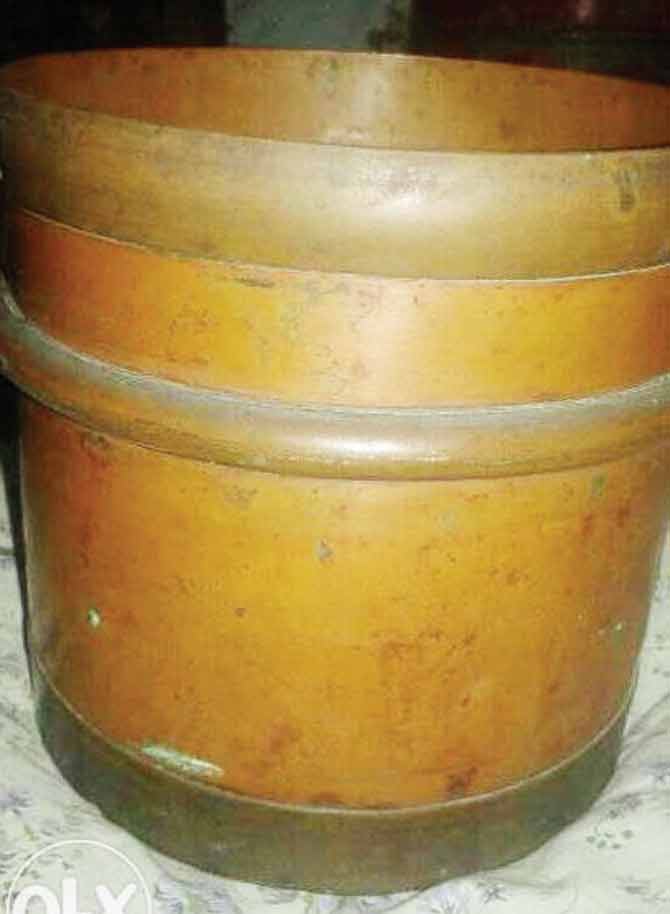
A British-era paili (measuring vessel) on sale by Sewri-based Gulab Imam.
Online antiquities
Stephen’s collection, which belonged originally to his father — noted philatelist and numismatist Stephen Varghese — is just one of many that are available on e-commerce sites. Prefixed by the words ‘ancient’, ‘old’, ‘rare’ or ‘antique’, woodcarvings, earthenware and manuscripts are popping-up by the dozen on routine searches. Vishwajeet Mohod, from Amravati, is selling an ‘ancient lock on Jodhapur palace’ for Rs 25,000. A set of three locks, Mohod tells us, were with his cousin who knew the Jodhpur royalty. “The locks were used for the palace tijori (coffer). They date back to the 18th century,” he says.
But, the category that tops the ‘ancient’ search results is coins. Right from depictions of a Ramdurbar (which is pitched at R20 lakhs) to Indo-Greek silver coins, the Internet is a haven for coin-collectors across the country. Most are accompanied by detailed descriptions of the coin, its origin, its make and rarity. Shopping for bits of ancient India just got as easy as surfing for clothes.
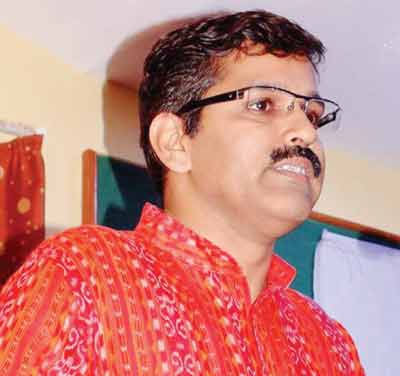
Dr Suraj Pandit, head of the department of ancient Indian culture, Sathaye College
Dr Arvind Jamkhedkar, a senior archaeologist and former director of the department of archaeology and museums in Maharashtra, prefers to use the word antiquity rather than antique. What’s the difference? Antiquity is the legal term used by the Archaeological Survey of India (ASI).
Citing the Antiquities and Art Treasure Act of 1972, Jamkhedkar says, “To paraphrase the ASI’s definition, an antiquity more than 100 years old, and has historical, archaeological and aesthetic importance.” With such a definition, whether paraphernalia like locks and keys fit the ‘antiquity’ tag is debatable and needs research.
Moving on
In a similar case, a taxi driver from Sewri, named Gulab Imam, is selling ‘an ancient British-era paili’ for R2.11 lakhs, funnily in the ‘Used kitchen and other appliances’ section. Imam says that the paili, an old measurement vessel (roughly four litres), was lying around at home, and his son came up with the idea of selling it on the Internet. “The paili belongs to my grandfather. As they say, old is gold,” he says, late in the night while wrapping up his driving for the day. However, experts are unsure whether the paili is rare enough to fetch a price that high.
The case with many Indian families, where heirlooms are passed on from one generation to the next, is a lot like Imam’s. Chances are that you might be in possession of an antiquity that has outlived its use.
Robin Rothmans, from Kollam in Kerala, is selling a wooden carving recovered from a demolished temple. He purchased the piece from a man in the business of old structures, and says it vaguely depicts a Shivling being washed and Lord Hanuman. The going price is Rs 15 lakhs.
“In recent times, the trend of demolishing old havelis and wadas, and selling away old furniture and things has increased. It is true that people cannot afford to maintain antiquities. The best options, therefore, are to either approach a museum or sell it to collectors,” says Abhijit Dandekar from the department of ancient Indian history, culture and archaeology in Deccan College, Pune. He adds, “Unfortunately, museums have thousands of objects and limited funds. Collectors who know the worth of antiquities will actually take good care of it.”
Licence to sell
Selling antiquities in India, however, is no child’s play. “If an antiquity is sold publicly, it has to be registered under registering officers at the State Department of Archaeology and the seller has to get a licence,” says Jamkhedkar. Additionally, if a registered antiquity moves states, the government needs to be informed; next, registered antiquities can never leave the country, even if it’s been bought by a non-Indian.
With unmonitored online sales of antiquities, chances of getting duped also run high. “This type of business increases the risk of people, whether sellers or buyers, getting cheated. There are several fake antiquities being circulated, especially where coins are concerned,” says Dr Suraj Pandit, head of the department of ancient Indian culture at Sathaye College in Vile Parle. Just last week, he broke the bad news to a person who had been duped into believing that a clay object he’d bought for R1,000 was from Mohenjo-Daro.
Informed sellers and buyers
If you think you own an antiquity, Pandit recommends taking it to the experts or to an auction house for evaluation. Hugo Weihe, CEO of auction house SaffronArt, agrees. “The field of antiquities is far more complex than contemporary art. We need to vet objects, provide context and authentication. Otherwise, people are just shooting in the dark.”
Experts cite London’s British Museum as a role model. Visitors can bring an object, and specialists will verify whether it is an antiquity or not. In India, no such service exists, yet. It helps if your father is an expert, as with the case of Stephens’ Chola coin pots.
More importantly, significant overlaps between government departments and clauses in Acts make it fuzzy for the layperson. Manuscripts, for instance, are antiquities, but don’t need to be registered with the ASI; you approach the National Manuscript Mission for those (unless it is an illustrated manuscript, in which case, you go to the ASI).
“Please remember,” urges Jamkhedkar often in our conversation, “that nobody is prevented from selling or purchasing antiquities in India. The modus operandi — whether it’s an auction or a website — does not matter. Registration, however, is certain.” The flipside, and the fear of many, is that the government can procure your beloved antiquity for the safeguarding of Indian heritage.
 Subscribe today by clicking the link and stay updated with the latest news!" Click here!
Subscribe today by clicking the link and stay updated with the latest news!" Click here!








